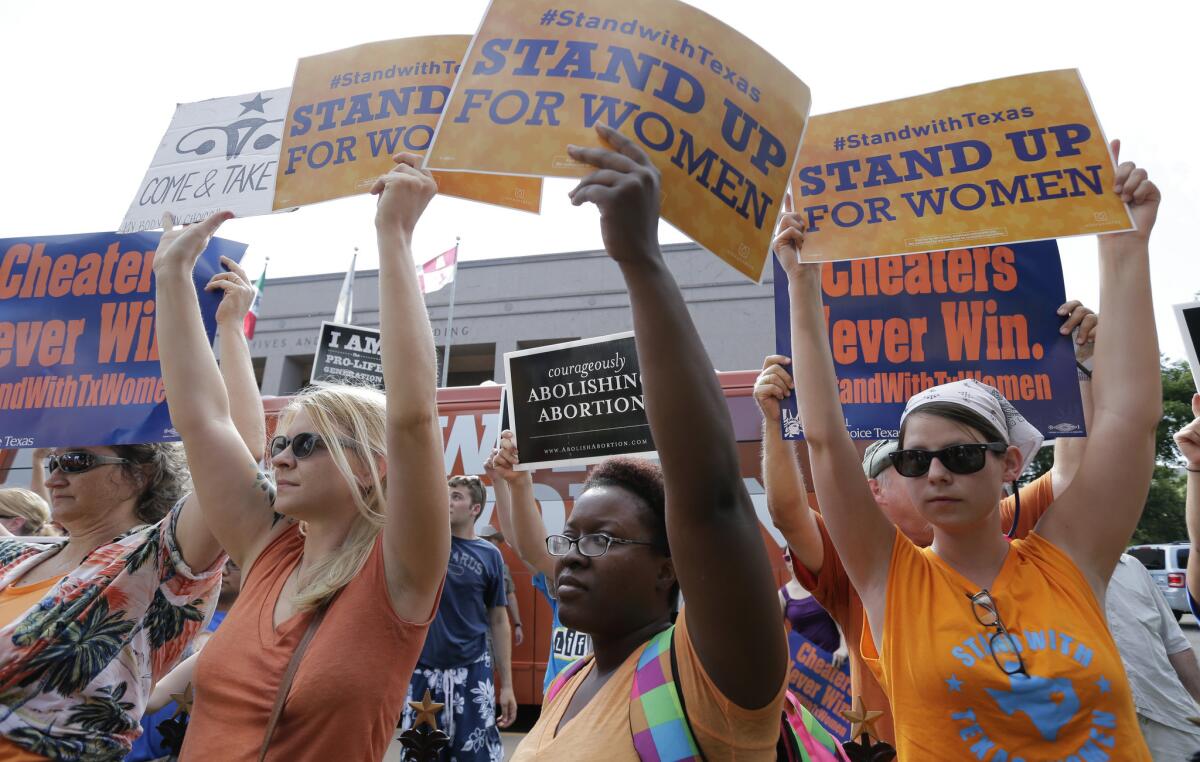Abortion clinics ask Texas restrictions be put on hold pending appeal

Opponents and supporters of an abortion bill hold signs near a news conference outside the Texas Capitol in Austin on July 9, 2013.
A coalition of abortion providers asked a federal appeals court Wednesday not to enforce its recent ruling, which would close most Texas clinics as of July 1.
The providers are requesting the stay so they can appeal the decision to the U.S. Supreme Court, arguing that, if the U.S. 5th Circuit Court of Appeals’ ruling goes into effect, clinics and women seeking abortion would suffer “irreparable harm,” according to court documents.
On Tuesday, a three-member panel of the 5th Circuit voted unanimously to uphold nearly all of the provisions of a Texas abortion law called House Bill 2, which was designed to limit access to the procedure and restrict when it could be conducted.
Under the law’s provisions, nearly all abortions after 20 weeks of pregnancy are banned, except in cases of rape or incest with a minor; and abortion-inducing drugs must be administered in the presence of a doctor, which would require most patients to visit clinics on three occasions.
In addition, doctors who perform abortions must have admitting privileges at a hospital within 30 miles of the clinic, and all clinics are required to have the same equipment and building requirements as ambulatory surgery centers, even if the clinics administer only oral antiabortion drugs.
The Supreme Court had said states may regulate the practice of abortion but should not put an “undue burden” on women seeking to end a pregnancy. With that guideline in mind, U.S. District Judge Lee Yeakel last summer struck down the surgical center requirements statewide and the admitting privileges requirement for two facilities.
Tuesday’s decision overturned Yeakel’s ruling, but the panel made an exception for a McAllen facility on the grounds that it is the only abortion facility in the area.
Abortion providers say that, under the ruling, all but eight clinics in Texas would be forced to close. If the U.S. Supreme Court eventually overturns the appeals court’s ruling, advocates say, it would be nearly impossible to reopen the clinics that were shuttered.
The result, according to court documents, would be that women in Texas would have to travel greater distances to obtain an abortion. That would cause some to delay getting the procedure and might prevent others from obtaining an abortion at all.
“Although abortion is safe throughout pregnancy, its risks increase with gestational age,” said the stay request, which was filed by the Center for Reproductive Rights on behalf of the Texas clinics. “As a result, women who are delayed in obtaining an abortion face greater risks than those who are able to obtain early abortions.”
Heather Busby, director of Pro-Choice Texas, said at least eight clinics were expected to close soon and that eight would remain open.
“There are no clinics west of San Antonio, no clinics east of Houston, the entire Panhandle has been without a clinic for almost two years.
“If you live out in these rural areas where public transportation is not a thing and you don’t have a vehicle to drive hundreds of miles to the nearest clinic, you’re completely out of luck,” Busby said.
The 5th Circuit panel made a “narrow exception” for the McAllen clinic, whose operator, Whole Woman’s Health, was still trying to figure out whether it could comply with the law, spokeswoman Fatimah Gifford said Wednesday.
The operator has already had to temporarily close the clinic before because of state restrictions, closed clinics in two other cities and may have to close their Fort Worth clinic under House Bill 2, she said, although the Fort Worth and McAllen clinics remained open this week.
On Texas’ western border, women in El Paso who saw local clinics close because of restrictive state laws are crossing into New Mexico to seek care at clinics that have since opened there and are not subject to the same licensing and regulations, she said.
“It defies logic and really exposes the farce of the supposed intent of this law. If the state was really worried that everyone had to get an abortion at this type of facility, why is it OK to shuttle people across state lines? It completely undercuts their stated intent,” Busby said.
Immediately after Tuesday’s court decision, Nancy Northup, president of the Center for Reproductive Rights, issued a statement critical of the law.
“Once again, women across the state of Texas face elimination of safe and legal options for ending a pregnancy, and the denial of their constitutional rights,” she said. “The Supreme Court’s prior rulings do not allow for this kind of broadside legislative assault on women’s rights and healthcare.”
Texas Atty. Gen. Ken Paxton, who championed the bill while he was a member of the state House of Representatives, also had issued a statement: “Abortion practitioners should have no right to operate their businesses from substandard facilities and with doctors who lack admitting privileges at a hospital.”
Hennessy-Fiske reported from Houston and La Ganga from Seattle.
Times staff writer James Queally in Los Angeles contributed to this report.
Follow @marialaganga and @mollyhf for national news.
More to Read
Sign up for Essential California
The most important California stories and recommendations in your inbox every morning.
You may occasionally receive promotional content from the Los Angeles Times.












